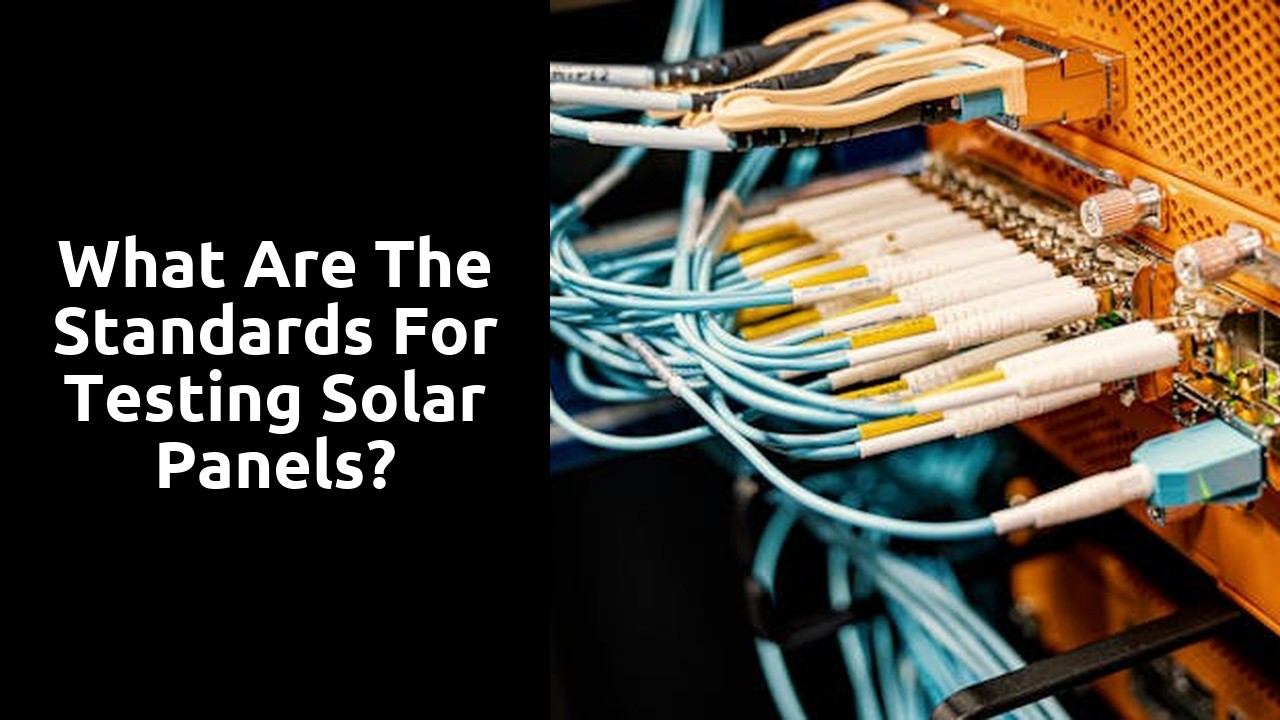
Environmental Impact Assessment in Solar Panel Testing
When considering Environmental Impact Assessment in Solar Panel Testing, it is crucial to evaluate the entire life cycle of solar panels. This involves assessing the environmental implications from the production stage to the operation and eventual disposal of the panels. An integral aspect of this assessment is understanding the energy consumption and greenhouse gas emissions associated with manufacturing, transportation, installation, and decommissioning of the solar panels. By conducting a thorough evaluation of each phase, it becomes possible to identify opportunities for improving the sustainability of solar panel systems.
Furthermore, during Environmental Impact Assessment in Solar Panel Testing, it is essential to consider the potential ecological impacts of solar panel systems on local flora and fauna. Solar panel installations can sometimes disrupt ecosystems, such as altering habitats or migration patterns of wildlife. Therefore, it is imperative for testing protocols to include measures that assess and minimise any adverse effects on biodiversity. By addressing these environmental considerations throughout the life cycle of solar panels, the industry can continue to progress towards more sustainable and eco-friendly Solar Panel System Performance Testing.
Recycling and Disposal Considerations
Recycling and proper disposal are critical aspects of managing solar panel waste. At the end of their lifespan, solar panels need to be handled responsibly to minimize environmental impact and promote sustainability. The materials used in solar panels can be recycled, which reduces the demand for new resources and helps decrease the carbon footprint associated with manufacturing new panels. Effective recycling programs ensure that valuable materials such as silicon, glass, and aluminium can be recovered and reused in the production of new solar panels, thus closing the loop in the panel lifecycle.
Waste management in the solar industry is a growing concern as the uptake of solar panel systems increases globally. Strategies for the responsible disposal of solar panels include identifying certified recycling facilities equipped to handle the unique components of solar panels. By adhering to established guidelines and regulations for recycling and disposal, the industry can continue to grow sustainably while mitigating the environmental impact of Solar Panel System Performance Testing.
CuttingEdge Technologies in Solar Panel Testing
Cutting-edge technologies are revolutionising the field of Solar Panel System Performance Testing. One of the most significant advancements is the use of Electroluminescence (EL) imaging. EL imaging allows for the detection of microscopic cracks and defects in solar panels that may not be visible to the naked eye. This technology enables early identification of potential issues, leading to improved panel efficiency and longevity. Additionally, the integration of Artificial Intelligence (AI) into testing procedures has enhanced data analysis and interpretation, providing more accurate and reliable results for solar panel performance evaluation.
Another innovative technology in Solar Panel System Performance Testing is the deployment of Quantum Efficiency (QE) measurements. QE measurements help to assess the efficiency of solar cells by evaluating how well they convert incoming light into electricity at different wavelengths. This precise method provides crucial insights into the overall performance of solar panels under various conditions, aiding in the development of more efficient and durable photovoltaic systems. By incorporating these cutting-edge technologies into solar panel testing practices, the industry is advancing towards higher standards of quality assurance and performance evaluation.
Innovations in Lab Equipment and Procedures
Innovations in lab equipment and procedures have significantly enhanced the accuracy and efficiency of Solar Panel System Performance Testing. Advanced data loggers and monitoring systems allow researchers to collect real-time data on solar panel performance, ensuring precise measurements under varying conditions. These technological advancements have revolutionised the testing process, providing valuable insights into the capabilities of solar panels in different environments.
Furthermore, the implementation of automated testing procedures has streamlined the evaluation of solar panels, reducing the time and resources required for testing. Automation not only expedites the testing process but also minimises the margin of error, leading to more reliable results. As the solar industry continues to evolve, ongoing advancements in lab equipment and procedures will play a crucial role in improving the quality and accuracy of Solar Panel System Performance Testing.
Role of Independent Testing Laboratories in the Solar Industry
Independent testing laboratories play a crucial role in the solar industry by ensuring the reliability and performance of solar panels. These labs conduct thorough Solar Panel System Performance Testing to evaluate the efficiency and durability of different solar technologies. By providing unbiased and accurate results, these facilities contribute to the credibility and advancement of the solar energy sector.
Moreover, independent testing labs help foster transparency and trust within the industry. Through their rigorous testing procedures and adherence to international standards, these facilities help manufacturers, consumers, and policymakers make informed decisions regarding solar panel selection and implementation. The role of these labs is pivotal in driving innovation and sustainable practices in the solar industry.
Impartiality and Credibility in Results
To ensure the veracity and integrity of results in Solar Panel System Performance Testing, impartiality and credibility are paramount. Independent testing laboratories act as watchdogs in the solar industry, delivering unbiased assessments that are free from any conflict of interest. By upholding stringent standards and protocols, these laboratories play a crucial role in maintaining the trust of consumers and industry stakeholders alike.
Transparency and adherence to established guidelines are fundamental to safeguarding the impartiality of testing outcomes. The credibility of results in Solar Panel System Performance Testing hinges on the rigorousness of procedures followed and the expertise of those conducting the tests. Upholding the highest ethical standards is imperative to preserve the reputation of the solar industry and ensure that the data generated is reliable and actionable for both manufacturers and consumers.
FAQS
What are the environmental considerations in testing solar panels?
The environmental impact assessment in solar panel testing ensures that the manufacturing, usage, and disposal of solar panels do not harm the environment. ####
How are recycling and disposal handled in solar panel testing?
Recycling and disposal considerations in testing solar panels focus on ensuring that components are properly recycled and disposed of to minimize environmental impact. ####
What are the cutting-edge technologies used in solar panel testing?
Innovations in lab equipment and procedures are continuously being developed to improve the accuracy and efficiency of testing solar panels. ####
How do independent testing laboratories play a role in the solar industry?
Independent testing laboratories provide impartial testing services to ensure credibility and reliability of solar panel testing results. ####
Why is impartiality and credibility crucial in solar panel testing?
Impartiality and credibility in results are essential to maintain trust in the solar industry and ensure accurate assessments of solar panel performance.
